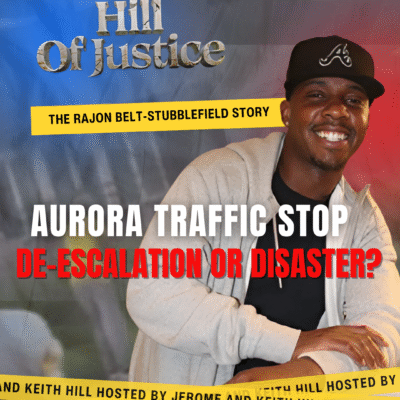
This Episode
In Aurora, Colorado, what should have been a routine traffic stop spiraled into tragedy in less than three minutes. An officer’s tactical decisions, a suspect’s movements, and a police chief’s press conference have reignited a nationwide debate: Are our police officers properly trained to handle high-stress encounters, or are systemic failures putting both the public and officers at risk?
In the latest episode of Hill of Justice, hosts Jerome Hill and retired Sheriff Victor Hill break down the chilling case of the Aurora traffic stop that ended in a fatal shooting.
What Happened in Aurora
According to the official story, the suspect fled from police, crashed into multiple vehicles, and discarded a handgun before moving back toward it. Within moments, an officer fired three shots, killing him.
Police leadership framed the shooting as an example of de-escalation tactics. But as Jerome and Victor explain, the situation reveals something very different:
-
Training failures that left the officer unable to holster his weapon or use lower levels of force.
-
Poor tactical decisions that placed him in a vulnerable “coffin corner” on a busy highway.
-
A flawed press conference by the police chief that redefined de-escalation to protect the department rather than demand accountability.
Why Training Matters
Victor Hill emphasizes that officers must be trained not only to draw quickly but also to holster quickly when a situation changes. De-escalation isn’t just about lowering your voice — sometimes it means disengaging until backup arrives. Without these skills, encounters escalate unnecessarily, putting lives at risk.
Leadership and Accountability
Leadership plays a pivotal role in shaping public trust. When chiefs spin narratives or rush to justify an officer’s actions without a full investigation, it erodes credibility. As Jerome points out, this is the fifth police chief in five years in Aurora, signaling deeper instability and systemic issues.
Why This Case Matters
This case is about more than one tragic incident in Aurora. It raises critical questions:
-
How should police balance de-escalation and disengagement?
-
What level of force is truly justified?
-
Can the public trust leaders who prioritize image over accountability?
Listen to the Full Breakdown
🎧 Episode Title: The Fatal Traffic Stop: A Case Study
Hosts Jerome Hill and Victor Hill analyze the Aurora traffic stop, exposing failures in training, leadership, and communication.
👉 Listen to the full episode here
(Available on YouTube, Spotify, and Apple Podcasts)
Final Thoughts
The Aurora case isn’t just about one officer’s mistake — it’s a wake-up call about the state of police training, leadership, and accountability across the country. Until law enforcement embraces real transparency and prioritizes proper training, tragedies like this will continue to happen.
📌 For more unfiltered conversations on law, justice, and the cases the mainstream won’t touch, subscribe to the Hill of Justice Podcast.
February 2026 M T W T F S S 1 2 3 4 5 6 7 8 9 10 11 12 13 14 15 16 17 18 19 20 21 22 23 24 25 26 27 28

Quick Links
© Hill of Justice 2025. All Rights Reserved. Powered by Juming Delmas Studios



Be the first to leave a comment